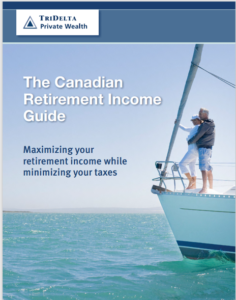Special to Financial Independence Hub
Over the years, we have received thousands of questions from clients related to a wide range of financial and planning issues. Without doubt, the highest volume of questions relate to how to manage the transitions from working to retirement.
To help address many of these questions, we have put together the 2024 Canadian Retirement Income Guide. This can be found on the link here: Canadian Retirement Income Guide – TriDelta Private Wealth.
The Guide highlights ten different sources of retirement income. Some range from the very common, Canada Pension Plan, to those that may only apply to some – life insurance, corporations, or home equity. The Guide is free and doesn’t require any input to get it (such as name or email.)
Perhaps the most common question is whether to take CPP at age 60 or 65 or even 70. The thoughts around a potential answer are discussed in the Guide as well as providing a link to a CPP calculator (CPP Calculator – TriDelta Private Wealth) and guidance on how to work with Service Canada. Similar discussions and links relate to Old Age Security (OAS), ranging from taking it at 65 to age 70, and also factors that might help you to avoid any clawbacks.
Other factors that need to be considered include minimizing taxes, not just for one year, but over the entire post-work period. One of the reasons for looking at every possible source of retirement income is that this can be the key to planning out the lowest tax retirement.
Some strategies discussed that could lower taxes could include:
- Delaying OAS and CPP to age 70, but drawing down RRSPs between retirement and age 70 – if you are healthy. The lower income drawdown of RRSPs will result in lower taxes, while helping to maximize government pensions and potentially maintaining full OAS payments.
- Using a balance of non-registered assets or a home equity line of credit, to keep taxable RRIF income a little lower.
- Better managing your investment portfolio to have (taxable) high income investments in your TFSA and RRIF, and maybe even focusing on low dividend, growth names for your taxable investments…or even no income ETFs.
- Taking advantage of full income splitting when possible, but possibly pulling extra funds when you can income split, given the uncertainty around how long this can last.
Overall, the Canadian Retirement Income Guide touches on many of the more common issues that many Canadian retirees face, as well as some of the more unique issues for high net worth retirees.
 Ted Rechtshaffen, MBA, CFP, CIM, is president, portfolio manager and financial planner at TriDelta Private Wealth, a boutique wealth management firm focusing on investment counselling and high-net-worth financial planning. You can contact him through www.tridelta.ca.
Ted Rechtshaffen, MBA, CFP, CIM, is president, portfolio manager and financial planner at TriDelta Private Wealth, a boutique wealth management firm focusing on investment counselling and high-net-worth financial planning. You can contact him through www.tridelta.ca.


